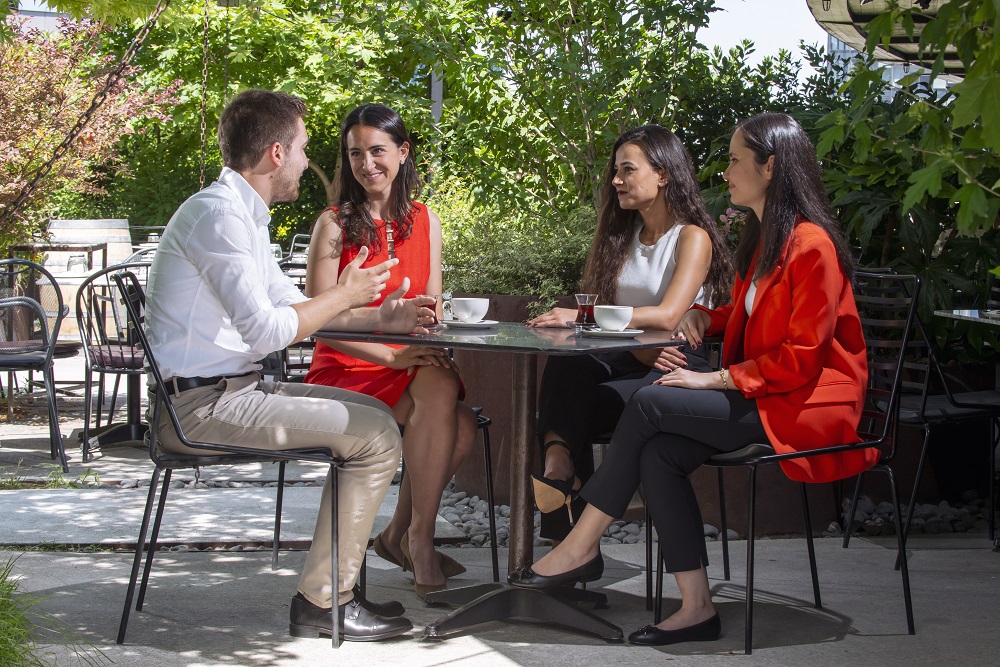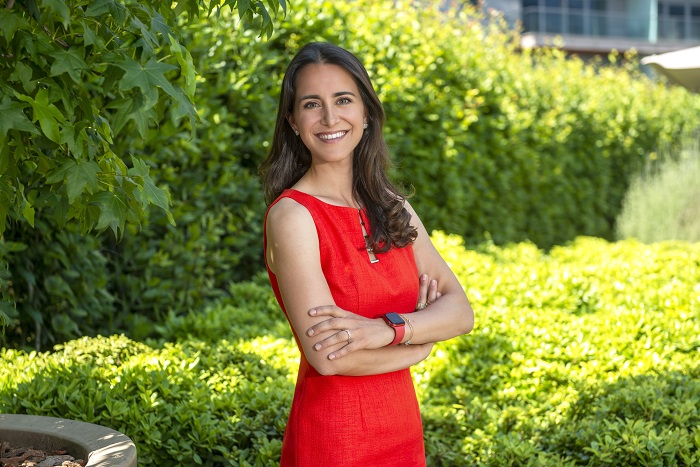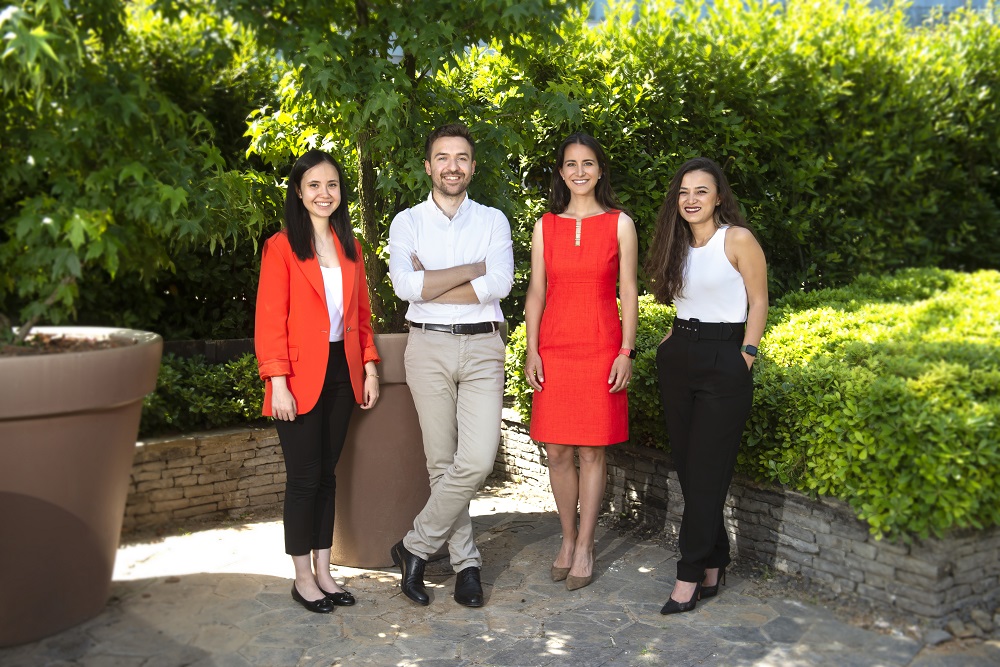Eczacıbaşı Holding Board Member and Group Digital Transformation Coordinator Esra Eczacıbaşı Coşkun was included in the World Economic Forum's Young Global Leaders list in 2022. She met with the Group's next generation of representatives to discuss the problems presented by the new era and the different perspectives that are needed to tackle these issues.
Taking part in the conversation on sustainability and the future for society and business in the context of both innovation and digital transformation, were Aslıhan Yemenici, Environmental Specialist for VitrA Tiles, Ezgi Paket, Data Scientist at Eczacıbaşı Information and Communication Technologies and Bertuğ Bingöl, R&D Engineer at Eczacıbaşı Building Products.
Ezgi Paket: What role do you think young leaders will play in shaping the future of our world? What are the Young Global Leaders’ prioritized agenda items?
Esra Eczacıbaşı Coşkun: YGL is a community created by the World Economic Forum (WEF) for young leaders worldwide to come together to inspire each other and others by sharing knowledge and experience. In this sense, it sets an exemplary model for taking an active role in the future of the world. Being on this list among young people who are sensitive to social issues and work for a healthier and safer future gives me both a sense of pride and responsibility.
Our world is experiencing rapid change and we’re witnessing the myriad and multiple problems associated with this transformation. I believe YGL has an important role to play in providing solutions to global environmental, social, and economic problems and can bring fresh perspectives to determine the direction that needs to be taken to address these issues. In this respect, YGL undertakes sensitive tasks such as strengthening cultural and social relationships, deploying strategies that ensure we adapt properly to changing conditions, and building bridges for sharing information between sectors, regions, and ideologies. I’m also delighted that YGL has a platform where members can share their knowledge and experience.
The priority agendas of Young Global Leaders align with those of our world. The World Economic Forum Global Risks Report 2022 states quite clearly that the most important and long-term risks directly from climate risk. We have been experiencing the direct and indirect negative effects of the climate crisis increasingly all over the planet for some time. A very rapid and very strong environmental, social, and economic transformation is needed to keep the global temperature increase below 1.5oC. .
The climate crisis is a problem with a domino effect. So much so that a one-sided point of view might lead us in the wrong direction. We know that increasing urbanization, population growth and climate change are putting pressure on water and food systems. Climate-induced forced migration will also continue to increase in the years ahead. The World Economic Forum’s Global Risk Reports draws attention to the fact that an estimated 200 million people will be displaced by climate change by 2050. Therefore, I think it’s essential for next generation leaders to be taking collective action as global change-makers to produce solutions to these complex issues.
Another important aspect that needs to be explored carefully is equality of opportunity... Equality of opportunity is a problem throughout society, from the personal level to the institutional, from non-governmental organizations to the public, and from educators to legislators.
Aslıhan Yemenici: What kind of impact will sustainability, which has so many dimensions and involves so many aspects of everyday life, have on companies, society, and individuals in the years ahead?
Esra Eczacıbaşı Coşkun: Regardless of the field or sector in question, business and management models are being designed within a sustainability-oriented ecosystem. Sustainability is a target of almost every platform today. Sustainability is no longer a choice but a necessity. It has become the subject of lengthy assessments at international summits, and urgent action plans are underway in this direction.
When we try to imagine what we can do as individuals, there are habits we can change and purchasing preferences that we can alter in our daily lives.
From a business point of view, sustainability is becoming more critical every day due to legal regulations, the future of resources and business and, most importantly, consumer expectations. Today, customers and stakeholders demand that when value is being created, it does not negatively impact nature, humans, or society. The climate crisis has of course contributed significantly to this demand. From a social and economic point of view, it's clear that the poorest and most fragile segments of society are, and will continue to be, most affected by the climate crisis due to income injustice and inequality. Considering all this, it’s essential that businesses and countries act together for sustainability-oriented and common goals.
Our Group does not view sustainability as the responsibility of a single department or team. We should all acknowledge the sustainability impact of the work we do. We also need to determine the best means for improving our processes and reducing their impact. Of course, it’s also imperative that we strengthen our sustainability governance, and so we’re taking the necessary steps towards this goal. We are aware of how important it is that senior management takes active ownership of this issue.
To this end, to strengthen sustainability ownership within our organization and at the Group CEO level and to promote greater strategic sustainable management of environmental, social, governance issues at the Board of Directors level, we’ve established the Environmental, Social, Corporate Governance (ESG) Committee. Group companies also have their own Sustainability Committees which contribute to the robustness of our overall sustainability governance.
In addition to our strong governance, our goals -which reflect our sustainability priorities- enable us to move forward in a planned and systematic manner. For example, in 2021, thanks to our targets and efficiency projects at our production facilities, we achieved energy savings equivalent to the daily electricity use of about 32 million people and water savings equivalent to the daily water use of about 1.4 million people. We set ourselves targets to increase our investments in renewable energy. By offering our customers a range of products that use fewer natural resources, we enable them to reduce the environmental impact of their lifestyle choices.

Aslıhan Yemenici: The disadvantaged position of women is an issue both at home and globally. The Eczacıbaşı Group continues to inspire companies in the sectors in which it operates with its pioneering work on gender equality. In what ways do you think successful gender equality practices can help a company stand out from the crowd?
Esra Eczacıbaşı Coşkun: Although gender inequality becomes more evident during difficult periods like the pandemic, it’s an issue that should always be at the top of any agenda, requiring attention and effort.
Many of us are aware that there are significant obstacles to women's access to education and health services as well as to their full and equal participation in social, political, and economic life not just in Turkey but also around the world. The removal of obstacles that block half of the world’s population is very important in terms of ensuring overall social well-being.
Any useful step to be taken in this regard can only have positive results. Research shows that women raised on fair and equal terms contribute more to the well-being and growth of Gross Domestic Product (GDP) per capita in their country. That's why the provision of equal opportunities for women is critical from an environmental, social, and economic point of view. Indeed, equal opportunity employers can access more powerful human resources. There are also numerous studies that show a strong correlation between women's representation on boards and positive corporate performance. Many companies have woken up to this fact and have increased the presence of women in leadership positions.
For all these reasons and given the “equal opportunities for all” vision which guides the human resources strategies of the Eczacıbaşı Group, equality of opportunity is one of our main sustainability priorities.
The Eczacıbaşı Group signed the United Nations Women's Empowerment Principles (WEPs) in 2013. That same year, we accelerated our equal opportunities push by participating in the Equality at Work Platform established under the coordination of the World Economic Forum and the Ministry of Family and Social Policies and created our Gender Equality Training Programs. In 2016, we brought together all the myriad equal opportunity initiatives that we had implemented until then under the umbrella of the “AllforAll” Equal Opportunities Platform. We are working to promote and support the employment of women employees in all areas through different policies and practices. Using the "AllforAll" platform to guide us, we focus on improving areas where there is less female employment in the Group; we continue our efforts to increase female employment, diversify our women-specific practices, and support overall equality of opportunity.
Furthermore, we provide maternity leave and other related support because it’s our duty to ensure the comfort of our employees during pregnancy and support their journey to becoming a mother. We also provide daycare support to all women employed at Group companies. Since our Group doesn’t differentiate between women's work and men's work, and we firmly believe that both parents have equal responsibility for child rearing, we offer paternity leave for a period of three weeks after birth and thereafter for one day a week for up to three weeks. In addition, we offer parental training for prospective fathers.
Ezgi Paket: What is your assessment of the importance of digital transformation for both societies and companies in the future?
Esra Eczacıbaşı Coşkun: Nowadays, the common denominator of most companies’ success stories is successful digital transformation. In today's digital world, it’s widely agreed that only companies which adopt digital solutions will be able to keep up with rapid change and survive.
The Eczacıbaşı Group's mission is to pioneer modern, high-quality, and healthy lifestyles. Accordingly, our goal is to shape the future of our business fields through digital transformation. Consequently, we regard digital transformation and our business strategy as part of a whole: Digital transformation is not a stand-alone project, it’s at the center of our business strategy.
This is the starting point of our digital transformation vision, which is: “shaping the future of our chosen business areas by embedding digital technologies and data in each process.” Two different approaches have guided us in determining our digital road maps. Firstly, our “from today to tomorrow” perspective; in other words, developing digital solutions to current problems. Secondly, applying the reverse perspective of “tomorrow to today”, which thinks about the future of our business sectors to adopt the right technology today. The questions and assessments that arose from this exercise resulted in four outcomes: customer focus, creating value from data, developing new business models, and changing culture.
A successful digital transformation provides not just one but many organizational gains. While contributing to sustainability by greatly reducing resource utilization, it also enables a task to be completed more quickly, saving cost, time and effort. I would like to explain this benefit through a tangible example. Traditionally, the acquisition of new B2B points and the determination of potential new sales are made via in-person visits. Now, however, we are crunching data to identify potential points for our bathroom business. Various parameters feed into our map reporting system, and the points are automatically marked in our site sales management system based on the algorithm's output. This determines which site visits are made. This project and the new points it recommended made a financial contribution to our business. When our business teams noticed this improvement, their appetite for digital transformation and creating value from data increased, so they’re working to get new projects off the ground.
Also, we shouldn’t forget the role of digital transformation in determining how societies share knowledge and experience. The dissemination of digital solutions has great benefits to offer in terms of democratizing data and, consequently, of reducing inequality.
Bearing in mind these many benefits, we’re working to strengthen our digital transformation efforts in different business lines. Our annual “Dijitaliz Meeting” is an opportunity to reward successful digital projects and encourage Group companies and brands to continue the path of digital transformation. We’re energized by the results of the impressive digital projects designed by our colleagues, and I’m confident we’ll see a steady increase in the number of these projects, which have such a great impact on our Group, our community and the environment. In this respect, I’m very proud to be the Digital Transformation Coordinator for this Group.
Bertuğ Bingöl: Today, innovation, digital transformation and sustainability actually move hand in hand. What do you think is the best way to manage these interlocking concepts to achieve robust outcomes? Can we use this holistic management approach to solve global issues in the same way that we use them to manage business processes?
Esra Eczacıbaşı Coşkun: Innovation, digital transformation and sustainability are interconnected in several ways, and as these bonds grow stronger, we achieve more efficient business results. In our innovative projects, we weave innovation and sustainability together, and digitalization is how these projects come to life.
I would like to provide an example of how we can discern the strong synergy between these three concepts. During the pandemic, when hygiene in public spaces gained priority, Eczacıbaşı Building Products took ownership of the issue and developed innovative products and solutions. In addition to producing more than 20 contactless technologies that help maintain the hygiene barrier, Eczacıbaşı Building Products collaborated with Eczacıbaşı Consumer Products to implement an innovative business model that created an ecosystem of products and services needed for a no-touch, hygienic public bathroom experience. The products and services were then packaged together with long-term payment options with the name “Toilet as a Platform” (TaaP).
The result was a project that includes sustainable and digital solutions that are beneficial to society and the ecosystem. In fact, there are many other similar examples I could give you, but the main thing is that the holistic approach I just described can be adapted to all business processes, and I think that the Eczacıbaşı Group has been particularly successful at adopting and implementing this approach.
We continue to support the achievement of our sustainability targets with our innovation processes and tools. Our Group-wide innovation strategy prioritizes areas of potential synergy, this primarily means efficient water consumption both during the manufacture and consumption of our products. In every business process, we consider the potential for greater resource efficiency and recycling as well as the future impact of our activities.
To effect change, we need interdisciplinary unity, a common will, and the courage to act collaboratively. I believe that this approach will lead to a more prosperous tomorrow not only for society but also for the planet.
Aslıhan Yemenici: How do you think young people and young leaders should approach the world's problems? How should one make a firm commitment to be a change-maker? What would you like to convey to the young leaders of our Group on this subject?
Esra Eczacıbaşı Coşkun: Today, the world is developing more rapidly than perhaps ever before. This progress is being spearheaded by younger generations. Younger generations are also guided by the experiences of previous generations. For me, this development is aligned with the culture of the Eczacıbaşı Group. Our Group is adapting to the conditions of the new era very powerfully by holding fast to its founding values, which have carried it with success to the present day. I believe in the power of this balance and harmony.
Young people have the dynamism and energy to achieve positive change in their societies. We need to channel this power more effectively into solving the world's problems. We can begin by focusing on how we can create more positive change within our own ecosystem. Greater efficiency of resource use, less consumption and recycling can be meaningful both at work and in our personal lives. On an individual level, choosing sustainable brands can also be another important approach.
The need for different perspectives and a new generation of leadership in finding innovative solutions to environmental and social crises is manifesting itself more strongly each day. Young people should take on a lot more responsibility under these circumstances. It’s important for individuals from different disciplines and competencies to come together and work towards the common purpose of solving complex problems and creating greater impact; moreover, in this technology age, young people around the world are much more networked than before. For example, by acting together and creating solutions together, young people from one side of the world can take ownership of an environmental disaster taking place on the other side.



